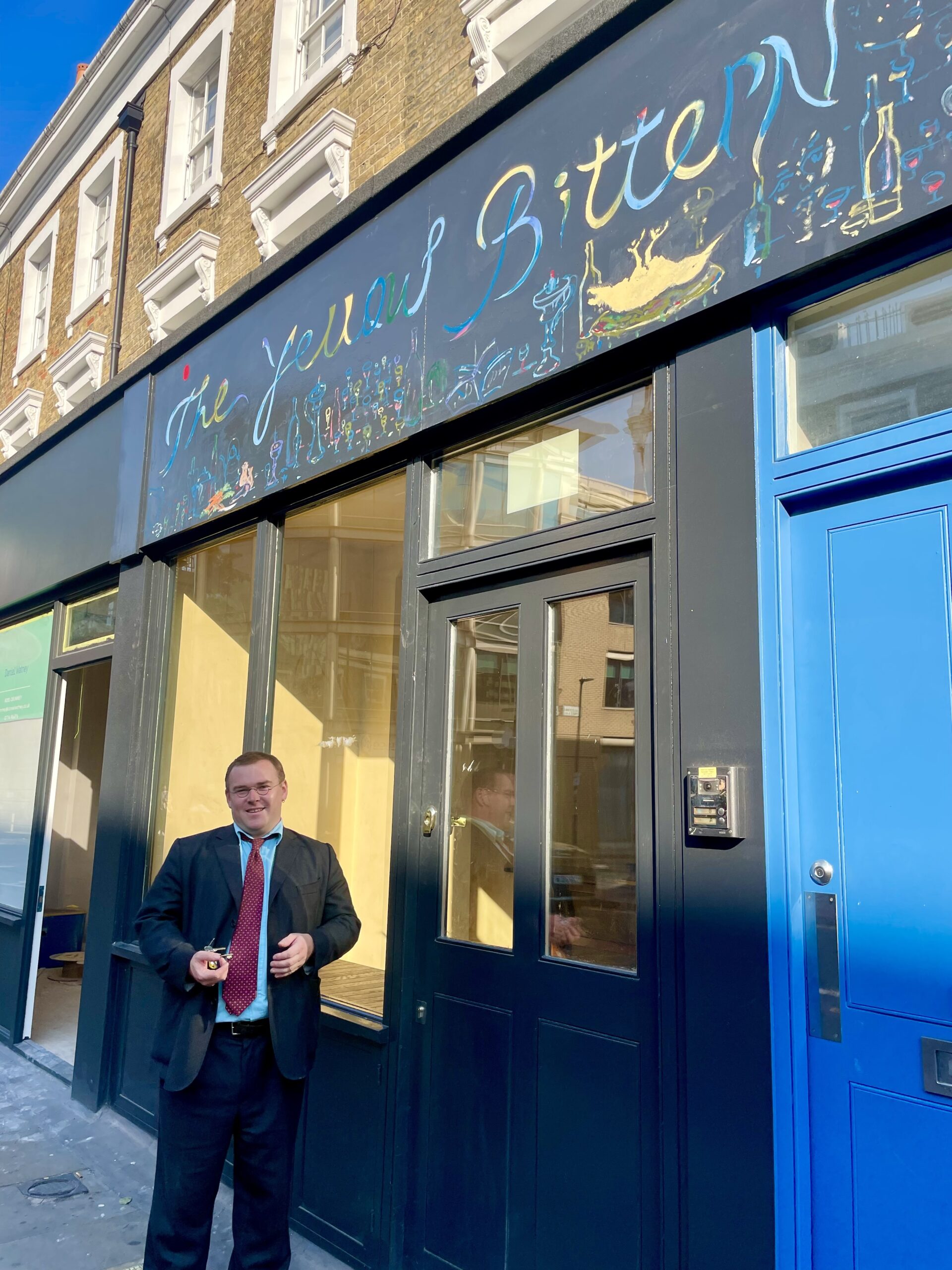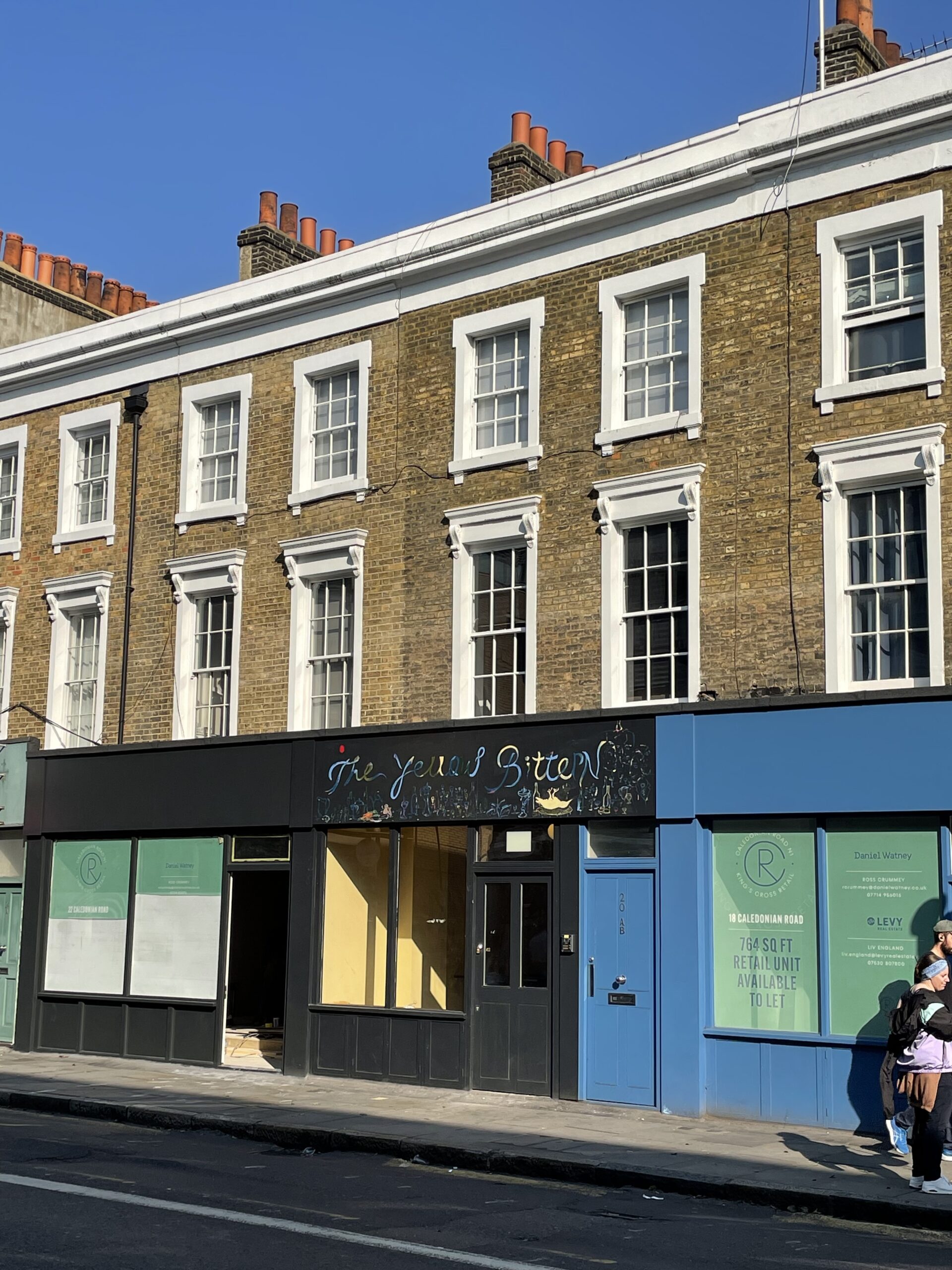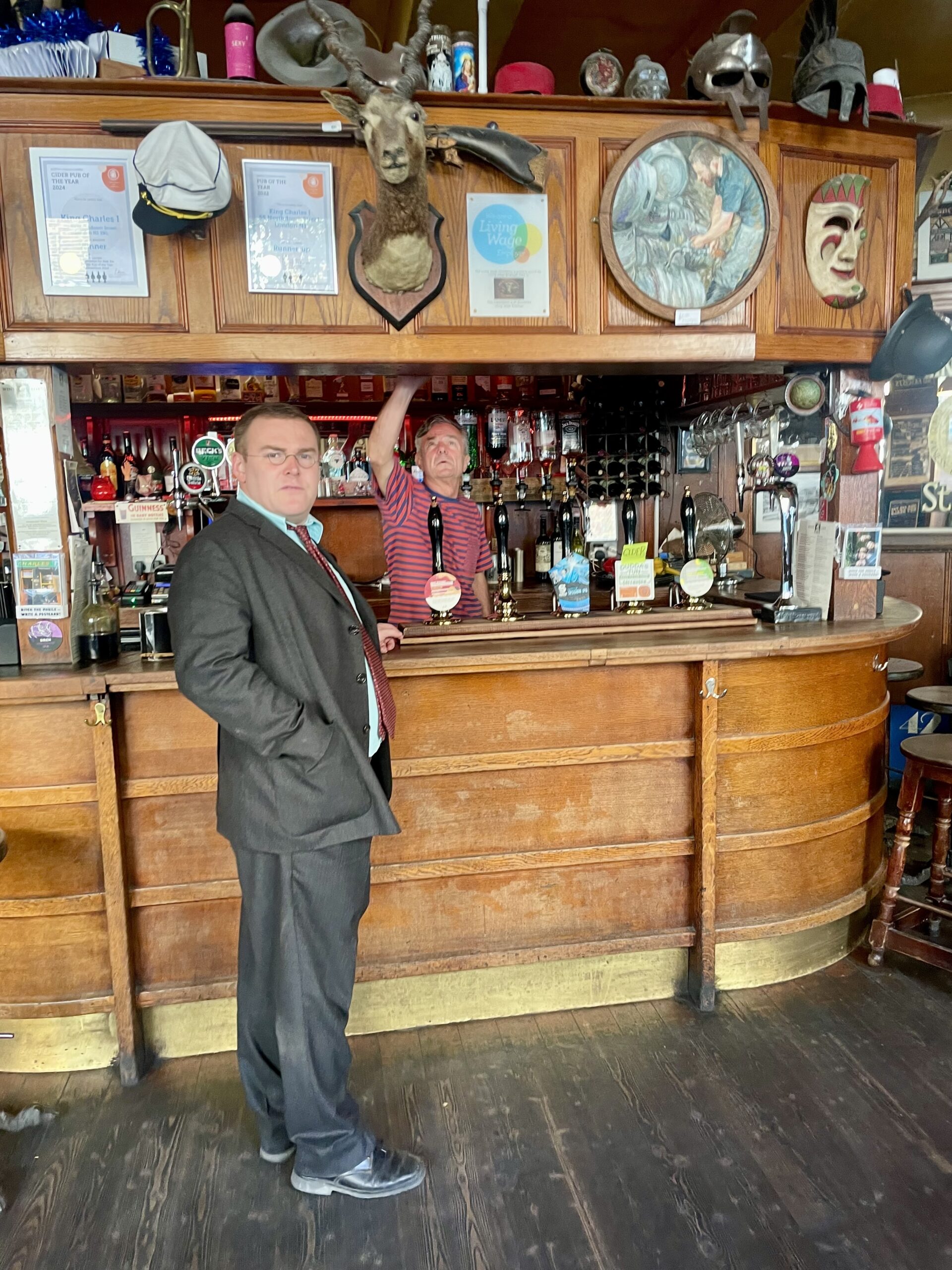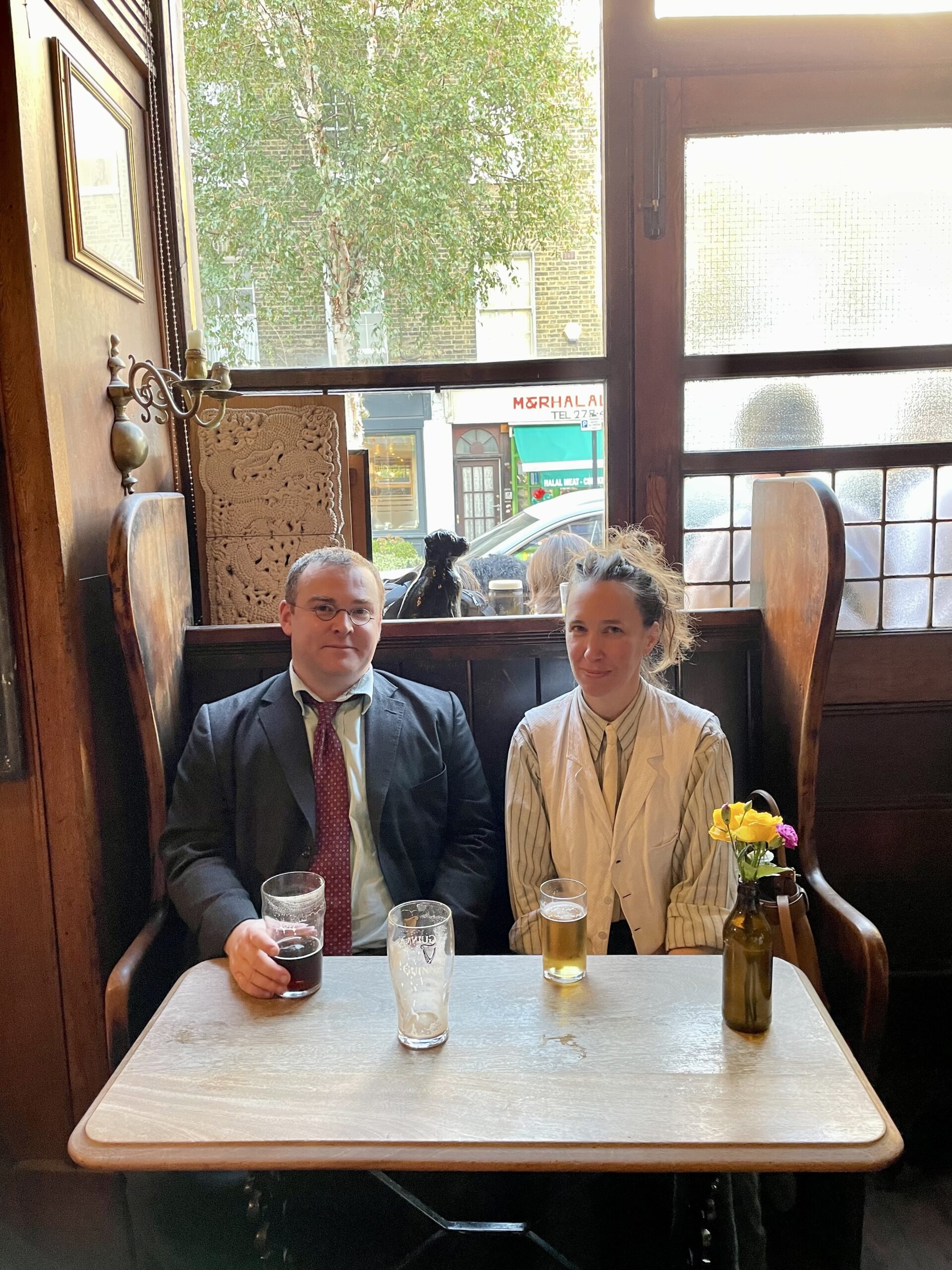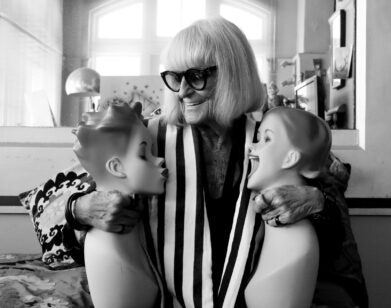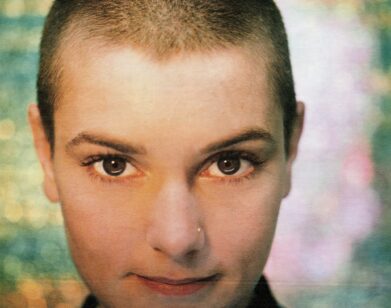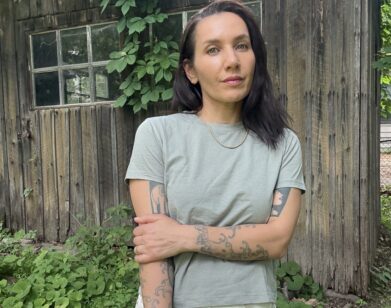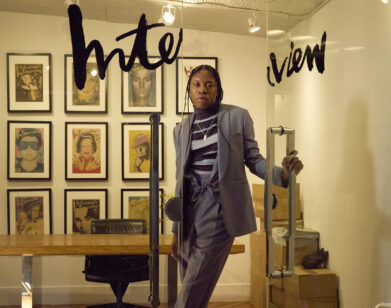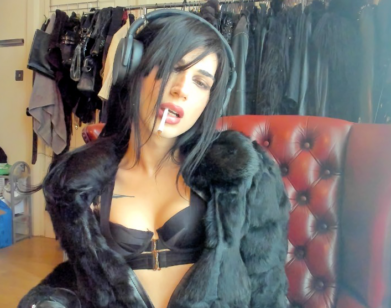Bon Appétit
Hugh Corcoran of The Yellow Bittern Wants to Bring Back the Long and Boozy Lunch
Last month, the Belfast-born and Basque Country-trained cook Hugh Corcoran made a bid for midday civility. Or, at least, his version of it, which looks like long, boozy lunches and easy access to Irish modernist paperbacks. In October, Corcoran, along with co-owners Oisín Davies and Frances Armstrong-Jones, opened The Yellow Bittern, a lunch-only restaurant and bookshop in central London. Named after an 18th-century Irish song, The Yellow Bittern is also home to Luncheon Magazine’s head office (von Hofmannsthal is the editor) and is located around the corner from King’s Cross station, RMT trade union offices, the British Museum, and a smattering of high street-type shops. Corcoran hopes that the proximity will lead to an eclectic range of patrons, mixing regulars with travelers on London layovers.
When I met with Corcoran, The Yellow Bittern was still under construction, so we got stuck in at a pub around the corner and discussed ‘80s and ‘90s restaurant culture, day drinking, Marxism, and the challenges of creating a democratic business, which including paying yourself, avoiding pretension, and making good food. Though some of his dictums (cash and phone reservations only) have already earned critiques, “the most important thing,” Corcoran avows, “is [that] you have a load of interesting people in the room. I find restaurants very uninteresting if they’re full of uninteresting people, even if they’ve got good food and wine.”
———
ESME HOGEVEEN: So you’re going to have the bookshop here?
HUGH CORCORAN: Yes. Oisín [Davies] has joked about what the bookshop is going to be. I suppose it’s a general interest bookshop of things we are generally interested in. He says we’re going to have a wide range of everything from Eastern-European Jewish Marxism to Irish Absurdism and nothing in between.
HOGEVEEN: So will he be curating it pretty independently?
CORCORAN: Myself and Frances [Armstrong-Jones] are involved in it as well. I’m doing the wine list and the food, so I’m happy to leave that to him.
HOGEVEEN: Oh, perfect. You mentioned that this restaurant will hopefully be a long-term commitment. I don’t know much about the restaurant industry, but you always hear about negotiations with landlords.
CORCORAN: I mean, we have a 10-year lease, and they have the right to hugely jack up the rent. Hopefully, they don’t. But it’s difficult to negotiate anything longer than a 10-year lease.
HOGEVEEN: That sounds pretty good to me. The windows? Lovely.
CORCORAN: Yeah, lovely sash windows. Actually, the back window is one of the main reasons we chose this space. Cooking in a kitchen with a window is lovely.
HOGEVEEN: It’s special. Do you imagine that you will be here most days?
CORCORAN: Yes. I’m very adamant that if I’m not here, the place is closed. I don’t like restaurants and bars where the owner isn’t there. I may ruffle some feathers by saying this, but the idea of these guys who just open restaurants and then—
HOGEVEEN: Run off?
CORCORAN: Yeah. They’ve got a restaurant full of diners, and they’re off playing tennis with their mates. I don’t want to be part of that. Shall we go? There’s a really nice pub around the corner. It’s owned partly by our landlord.
HOGEVEEN: Cool. I want to say before we go, though, that it’s really beautiful. The yellow is so buttery and warm.
CORCORAN: Yeah. This painting is by Peter Doyle. He’s in the middle of doing it. We didn’t want to get a sign, so Peter, who did the illustrations for my book, started painting this. The composition is people sitting around a table with wine and food being prepared. And “The Yellow Bittern,” which I’ll explain later—have you read the poem?
HOGEVEEN: I read it. It’s an Irish poem originally, too. Is Peter somebody you collaborated with prior to the book as well? You obviously have a strong connection.
CORCORAN: Yes, actually. Myself and Peter met at Grogans Pub in Dublin.
HOGEVEEN: I’ve been there.
CORCORAN: It’s a great pub. Peter was just about to move to Paris, where I was living at the time, and I said, “When you get to Paris, give me a ring and we’ll meet up for a drink.” It’s just nice to have another Irish person around. I didn’t know many Irish people in Paris.
HOGEVEEN: What’s the Irish expat community in Paris like?
CORCORAN: Limited. Quite middle class, quite academic in some ways. It’s not like London where there’s a history of mass immigration that’s very working class. It has a literary thing, like [James] Joyce and [Samuel] Beckett. What are you having to drink? I’m drinking bitters, but the Guinness is good here.
HOGEVEEN: I’ll have a Guinness, thank you. So it was nice to have a countryman in Paris?
CORCORAN: Yes, I worked with him first on a story for Luncheon. But I’ll tell you how we all met. Oisín, his mother, comes from Belfast—Bríd Brennan, well-known actress. And her father, Pat Brennan, owned a bar, the famous Pat’s Bar. I met Oisín in Paris the day before Bloomsday. I was sitting reading Ulysses and Oisín’s partner, Maddie, said, “Are you reading Ulysses over there?” Oisín’s lived in London his whole life, but he feels very Irish and knows an awful lot about Irish history. Anyway, Oisín came down to a place I was working at that time in Paris called Delicatessen. We had a Bloomsday evening—bottles of Burgundy, gorgonzola sandwiches, kidneys on toast. And at the end of the night, we went out for a drink. Oisín said to me, “You ever heard of a bar called Pat’s Bar in Belfast?” I said, “Don’t even talk to me about Pat’s because it sickens me that that bar closed. It’s the best bar in Belfast.” There was a vase of flowers on the bar where I was working in Paris, because my mother told me the sign of a good bar, like Pat’s, is fresh flowers on the table every day and handing out ham sandwiches for the porters at the end of the night. I always had ham sandwiches, and I always had flowers on the table. Oisín said to me, “Pat was my grandfather.” So that started the friendship between us.
HOGEVEEN: He proved himself.
CORCORAN: Yeah. That kind of lineage is important to me because I still look at Pat’s Bar as a shining example. Oisín’s mother talks about the ’70s in Belfast, and it was a pretty dark time. People were scared shitless walking the streets [because of] the British Army, and it was also very dangerous for Catholics to be in North Belfast. A lot of bars at that time had cages on the front doors. Pat’s never had a cage. The door was always open for whoever wanted to walk in. She said that you pushed the door open and there was a flood of light and music and conversation and a sense of liberation and unity between classes and religions. I mean, Pat himself was obviously a Catholic and probably a nationalist. But it also was a bar for trade unions from both sides of the divide, Protestants and Catholics. There would have been sailors from all over the world. They accepted all currencies—yen, rubles, dollars.
HOGEVEEN: So that was where you drank and came of age?
CORCORAN: Yes, and I used to go there with my parents when I was a child. I don’t want to portray myself as a nostalgic conservative, but I certainly have a nostalgia for the late ’80s and early ’90s. You walked in a bar with a handful of notes and paid. None of that happens anymore. I’m the only one paying in cash all the time. I don’t want to get too misty-eyed about the ’90s because it wasn’t all good, but the pretension of restaurants now is just unbearable.
HOGEVEEN: I observe in North America the phenomenon of the spindly chair. You go to a bar or a café and you’re never really comfortable, because you’re never sitting on a solid chair. Everything’s very teeter-y. Is that a phenomenon here as well?
CORCORAN: I haven’t really thought about it. The only thing I’m really against is high tables and stools everywhere. I hate that.
HOGEVEEN: That’s part of the spindly phenomenon.
CORCORAN: Yeah. I also wouldn’t have people using a computer in the restaurant. But going back to the ’90s, there was also a certain amount of devil-may-care, throwing caution to the wind. Huge amount of drinking, a kind of alcoholism that just doesn’t really exist anymore. I mean, I attempt to live up to it. But people thought nothing about drinking in the middle of the day. Now, we’ve got to this stage where nobody really wants to let go. They’re all worried about smoking. I’m ranting a bit, but I see this obsession with the body and health as a little fascist, ideologically. In fact, it’s like what the Nazis did, looking after your body and being beautiful. I like ugly. I like people who don’t pay so much attention to every attribute of their body, how much weight you have or haven’t put on or how big your muscles are. I see it as a kind of quasi-fucking-fascist ideology, something that doesn’t include the marginalized in society.
HOGEVEEN: Totally. And it’s associated with a higher moral position.
CORCORAN: Yes, certainly. I’m not interested in morality. I don’t like to see myself as a businessperson. However, whether I like it or not, I do own a business now. I’m a member of the petit bourgeoisie for the first time in my life. But I like to see it more as an artisan trade specialty. We’re artisans who know how to cook and how to buy and sell books.
HOGEVEEN: So you, Frances, and Oisín are the only people working?
CORCORAN: Yeah. Frances has Luncheon Magazine, but it is very small. My father was a mechanic. He only ever had one apprentice. He worked from his garage. He was the owner of the business, but he wasn’t a businessman. He was a tradesman. He got big wads of cash in his pocket that he probably didn’t declare. Again, looking back on the ’90s, that was so typical of working-class and lower-middle-class life. That independence is very important to me. It’s a mistake to think that the objective of Marxism is to ingrain the working-class culture. It’s the opposite. It’s to do away with all classes and to become a little bit more free in your life, to not have to participate in the degrading work of wage labor and to be able to have more say over your own life. It’s quite a liberating thing.
HOGEVEEN: How are you feeling at the moment?
CORCORAN: It’s stressful, because we have builders and deliveries all the time. I probably should get a diary. I’ve no idea what’s happening every day.
HOGEVEEN: It feels like a dumb question, but I want to ask in earnest. How do you cultivate a space in this city that’s so—
CORCORAN: Transient?
HOGEVEEN: But also encompasses different class traditions. There are so many ideas about London and the people who live here.
CORCORAN: I believe in a democratic space. Democratic in the sense of “populaire,” for the people. However, there’s a certain price range, and if you can’t afford that price, you can’t really come. I don’t think Deliveroo guys on bicycles are going to be able to afford to eat there, which is the new lowest rank of the proletariat. But if you’re a unionized worker and you work on the railroads, you’ll definitely be able to afford to go. Frances has lived in North London for a long time. We live in Camden. So we wanted somewhere close to home. And there’s a connection with The Pogues and Shane MacGowan, in particular. The story goes that he wrote “A Pair of Brown Eyes” in one of the pubs down the road.
HOGEVEEN: Songwriters and novelists are obviously strong in the DNA of The Yellow Bittern. Would you hope that people use this place to congregate creatively?
CORCORAN: The original idea was connected to Luncheon Magazine. Frances has a huge amount of interest in creative people and a lot of them contribute regularly to the magazine. Radical left voices, but also voices in the fashion world. It’s quite Bohemian, in a way, and the idea was to create a physical space for all those things to happen. The food or wine is actually not that important. I mean, I like a nice plate of food, but it’s secondary to who’s in the room. The most important thing is you have a load of interesting people in the room. I find restaurants very uninteresting if they’re full of uninteresting people, even if they’ve got good food and wine. There’s so many interesting characters who don’t have loads of money in the bank. You exclude those people from your restaurant, but I want those people in my restaurant. I don’t want the people who pay with their watches in the restaurant. So, sorry if you have an Apple Watch.
HOGEVEEN: This is a humble Swatch watch I was gifted.
CORCORAN: I had one of them until recently. But generally, I find bookshops more interesting than restaurants. I think if I was comfortable financially, I’d probably just have a bookshop. But that’s really rolling the dice.
HOGEVEEN: Can you say more about your vision for lunch? This idea of the boozy lunch seems like a pivot back to the late ’80s culture that you mentioned.
CORCORAN: Yes, but also to the 1700s. It’s going back to the idea that we’re only here once, so you may as well have a good time. Get drunk in the middle of the afternoon if you can afford to. Don’t spend it in the gym. Have a bit of fun and let your hair down and stop taking yourself so seriously. In terms of what lunch is, I also have quite strong opinions on what should be served in a restaurant. I think that lunch and dinner should have a structure. I don’t like that shared plates thing that basically becomes a posh tapas bar.
HOGEVEEN: What’s your view on the structure for lunch?
CORCORAN: I like the idea of always starting with a soup. Because we don’t have a huge kitchen, we’re very limited. So that’s followed by maybe a roast chicken, a green salad, a piece of cheese, and then a pudding.
HOGEVEEN: Lovely. What kind of pudding?
CORCORAN: Nice English puddings and a bit of French pudding, like sticky toffee pudding, and apple and blackberry pie.
HOGEVEEN: My impression is that seasonality is relevant but not everything. You’re going to be using food from your garden?
CORCORAN: Yeah. It will be properly seasonal. What grows well in England? Surprise, surprise: it’s potatoes, carrots, leeks, cabbages, peas, runner beans, and green salads. That’s great, and you can base a kitchen on that.
HOGEVEEN: Divine. Is it blackberry season right now?
CORCORAN: Yeah.
HOGEVEEN: I’ve been trying to see if a blackberry pudding will cross my path, and it has not.
CORCORAN: You know why? Very few restaurants are going out to forage for blackberries, and they don’t really grow blackberries on farms. We’ll have blackberry pudding on the menu, because we send the kids out to get the blackberries. We have a small orchard, and we have apples and quinces—
HOGEVEEN: Quince? That seems very English to me.
CORCORAN: Yeah, it’s Victorian. And medlars as well, which is very English.
HOGEVEEN: Medlars? What is that?
CORCORAN: It’s an ugly little apple. I shouldn’t say it’s ugly, because it’s quite beautiful, but it is kind of decrepit. You have to leave it to rot, and then when it gets soft, you push it through a strainer to make a jam.
HOGEVEEN: You wouldn’t have it fresh?
CORCORAN: No, you wouldn’t eat it as a fruit. It’s very hard.
HOGEVEEN: The menu overall would be skewing English.
CORCORAN: English, Irish, with a touch of French. And influences from the Basque Country, where I lived for a long time, but not obvious influences. We’re not going to have Basque turbot. To the untrained eye, they’re completely disguised, like the way the Basque cut potatoes.
HOGEVEEN: How do they?
CORCORAN: They don’t chop them on a cutting board. They crack them open with a knife, which is quite a nice way of cutting potatoes. Last time I went to the Basque Country, I brought home some peppers called pimiento choricero, which is good for making fish soup.
HOGEVEEN: So you’re calling upon those learnings that were relevant?
CORCORAN: Yes, a kitchen has to be a living thing. It has to be representative of your whole life. I hate these concept restaurants that say, “We do Basque fish cooking.” Or, “We do Majorcan mountain cooking.” It’s fucking ridiculous. Why would some English person who doesn’t work in the restaurant on a day-to-day basis open a restaurant that’s native to a region hundreds of miles away? You don’t have the products that you’d have in the Basque country. It’s just completely bizarre.
HOGEVEEN: Do you envision The Yellow Bittern being part of an existing community that’s pushing for similar values in terms of ambience or politics or food itself?
CORCORAN: No, I think we’re trying to do our own thing and not be so pretentious as to think we’re part of anything. There are certainly institutions that we hope to work with, but they’re not necessarily institutions that even know that we exist or align themselves with us. We love the RMT, the most radical union in the country, full of left-wing first and second generation Irish immigrants. But as far as they know, we don’t exist. We’re not really part of anything. We’re resisting the very vicious turn that the world is taking towards technology and exclusivity– the fact that you can’t even book a restaurant if you don’t have a smartphone and the internet.
HOGEVEEN: I wanted to talk to you about reservation culture. There’s a feeling that reservation culture has destroyed spontaneous dining.
CORCORAN: I feel the same way. It’s taken the romance out of phoning somebody and booking a restaurant. It’s just awful. I refuse to do it. I don’t really like using my phone that much. The French are very good at that. Like Bistrot Paul Bert, the only way you can book is by phoning them, and they write down your name and number. Here, it’s completely changed. We want to do cash-only in the restaurant because we see cash as the last vestige of privacy. You can go in and spend cash in a restaurant, and people don’t know you’ve been to that restaurant. The bank doesn’t know.
HOGEVEEN: People rely on their phones to access subcultures—books, restaurants, events. So how do people find out if not through their phones?
CORCORAN: Community. I’m only 34, and I can remember a time before social media. I drank a lot in The French House and The Academy Club, places like that. None of those places use social media, really. You just go there and meet people. The French House doesn’t need to advertise to get me to go there. I’m going because it’s a pub I like. I love the atmosphere, same as this place. Building up that sense of community again is very important. Also, there’s nothing inherently wrong with using technology to let people know what’s going on. But I just think it cannot become the only way of communicating. It’s not just about social media. It’s about the fact that there’s loads of pubs in London that you can’t pay in cash. It’s card-only.
HOGEVEEN: It’s kind of grim. Tell me about “The Yellow Bittern.” How did that come into your life, and why did you choose it for the name of the restaurant?
CORCORAN: I’m an Irish speaker, and I speak it to the majority of my friends. I grew up speaking English. But when I was about 16, I left school and started learning Irish. Then I moved to Donegal and became friends with guys who were sean-nós singers. Sean-nós means the old style of singing. They would sing the great songs of old school around the fire, one of them being “An Bonnán Buí,” or “The Yellow Bittern.” It’s a poem, but it’s sung a capella. It comes from Cathal Buí Mac Giolla Ghunna, who was one of these wandering bards. He was a notorious drinker, and one of the great poets of Gaelic Ulster in the 17th century. That was really important for me, to have that connection to Irish literature and recognize where I’ve come from. Northwest Donegal holds a very strong place in my heart. I didn’t want to abandon those roots and become some kind of London hipster. I was told once that there was an Irish language culture and social club in Dublin in the 1970s called An Bonnán Buí. I also love the idea that Irish musicians might come spontaneously. They might ring me up and say, “Hi, Hugh. Can I come for lunch?” and I’ll say, “Yeah, of course. Will you bring a fiddle?”
HOGEVEEN: I was curious about what music will be like at the restaurant.
CORCORAN: There won’t be any music played on the stereo. I don’t think we need to be bombarded with tripe stereo music all the time. Does the music playing in this pub right now add anything to the atmosphere, or is it just annoying and distracting?
HOGEVEEN: I liked the David Bowie song.
CORCORAN: It’s a great song, but I can go home and listen to my record player. When I’m listening to music, I like listening to music. When I’m in the pub, I like to be in the pub talking. This country is not a country that respects music because music is in every fucking pub. It’s a nightmare. I don’t really listen to a lot of contemporary music.
HOGEVEEN: I feel like we’re kind of having a moment of contemporary obsession with Irish culture. How does it feel to hear that?
CORCORAN: Yes, I think you’re definitely right. Personally, I don’t really like Sally Rooney. I wish I liked her because she describes her thoughts as a Marxist. She’s clearly on the left and well-intentioned. I just find that literature really cloying and tragic.
HOGEVEEN: Too sentimental?
CORCORAN: No. I’m not interested in the sex lives of good-looking young people. We have this kind of nationalist lineage of Irish literature. But to think that Beckett and Joyce are put in the same literary lineage as Sally Rooney is fucking embarrassing.
HOGEVEEN: Why? Because her concerns are with the middle-class or upper-class?
CORCORAN: No. Joyce obviously wrote about the middle class as well. But in the modernist writing in Ireland, there was simplicity and genius. Sean O’Casey, and the beautiful and piercing lines of John McGahern, none of this is to be found for me in Sally Rooney. Just because she’s Irish doesn’t mean that she’s unique. People describe themselves as an Irish artist, and it’s like, “What’s Irish about your fucking paintings?” You’re an artist who happens to be born in Ireland. And it’s in the kitchen as well. We’re Irish, but how is that inherently important? It’s great that we can all say we’re proud to be Irish now, but when the IRA were planting bombs in Manchester, all those people were ashamed of their identity. If it was threatening to British imperialism, it wouldn’t be cool.
HOGEVEEN: In the past few years, post-Brexit specifically, I feel like there may be a renewed fetishization.
CORCORAN: Because Ireland’s becoming European?
HOGEVEEN: Yeah.
CORCORAN: I would say that Ireland has managed to modify itself and sell its image because it helped greatly at the end of The Troubles. Irish bars have obviously existed in certain cities for a long time, but the phenomenon of having an Irish bar everywhere in the world is a new thing. Ireland being associated with drinking and having a good time is really embarrassing to me. I don’t want to be associated with that. Obviously, all Europeans drink huge amounts. I think the Irish have a difficult relationship with drink because they tend to binge drink a lot, whereas Europeans drink continuously throughout the day. But I don’t want us as a nation to be represented by a bozo drinking a large pitcher. I would much rather be associated with modernism, with Joyce and Beckett, but also with republicanism and the struggle against imperialism and colonialism. Our reputation around the world right now, particularly with the Palestinians, is that we’re the only country in Europe comfortably standing up and saying it’s wrong. That’s what I want us to be known for.
HOGEVEEN: How long do you think it takes to cultivate regulars?
CORCORAN: Not to be cocky, but as long as you have the right person at the bar—and I suppose I’m usually at the bar—it doesn’t take long to cultivate that. When I ran the Delicatessen in Paris, I was there for a year, and within a year, it was a cult. We had regulars from the first month or two. I don’t know how this will work because Paris is much smaller, but I’m sure we’ll have regulars.
HOGEVEEN: No doubt. You’re starting to get postcards, I see. Do you have a community that will make reservations that way?
CORCORAN: It was just a joke, but then people started actually sending postcards. I think it’s great. Why not?

